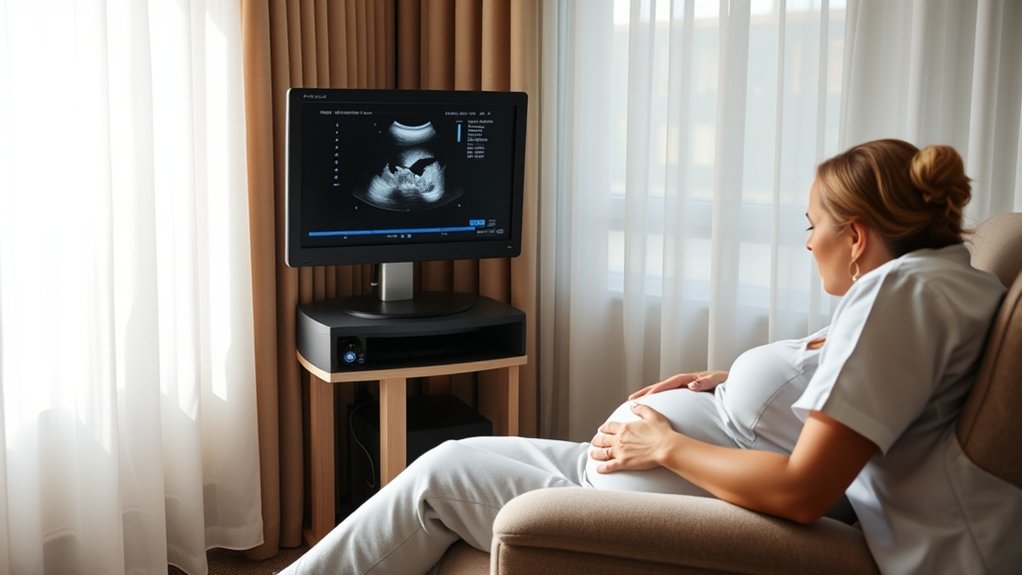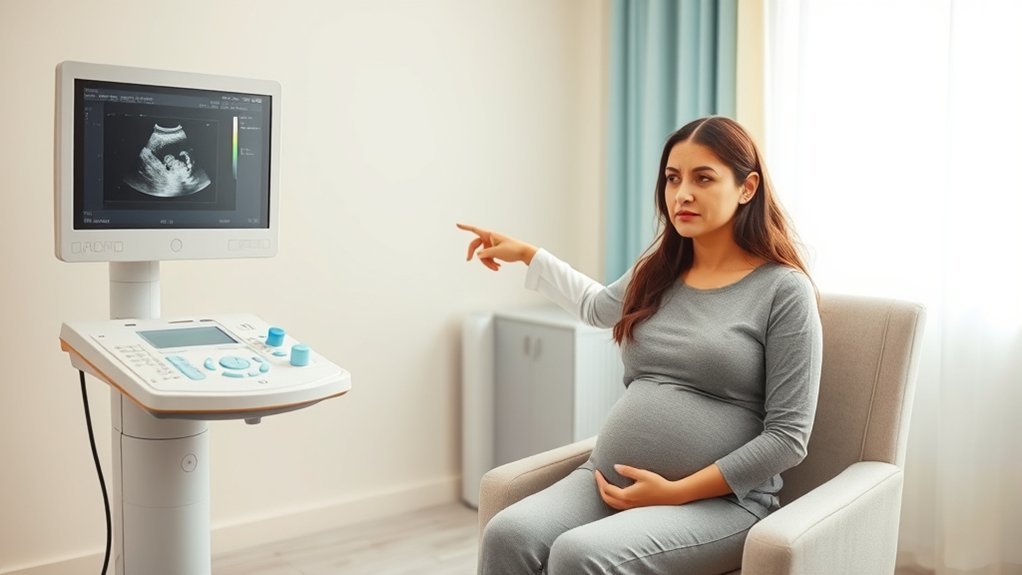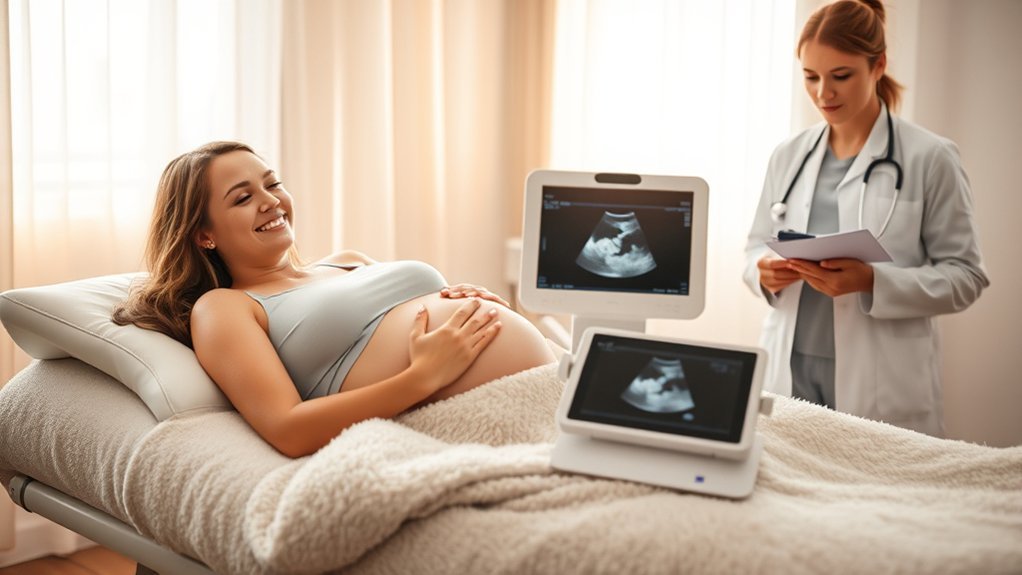It’s a common belief that IVF pregnancies are straightforward, but the reality can be quite different. As you navigate this journey, recognizing when to reach out to your healthcare provider is essential. Understanding the signs and symptoms that warrant a call can make all the difference in ensuring a healthy pregnancy. Are you aware of the vital situations that require immediate medical attention? Let’s explore these important aspects together.
Understanding IVF Pregnancy Monitoring

When you undergo IVF, understanding the monitoring process is essential for your peace of mind and the health of your pregnancy. Monitoring appointments typically follow your IVF cycle closely, involving blood tests to measure hormone levels, particularly hCG, 9-14 days post-embryo implantation. A second test 48 hours later confirms pregnancy viability. It’s important to watch for complications; if you experience severe abdominal pain, heavy bleeding, or cramping, contact your doctor immediately. Should your pregnancy test return negative, consult your healthcare provider for the next steps. Emotional support from friends, family, and medical professionals plays a significant role during this time, helping you navigate the challenges and uncertainties of IVF pregnancy monitoring effectively.
Common Symptoms to Watch For
Monitoring your health during an IVF pregnancy means being aware of specific symptoms that could signal complications. Watch for signs of ovarian hyperstimulation syndrome (OHSS), including severe abdominal pain, rapid weight gain, and shortness of breath, which need immediate medical attention. While light bleeding can be common, any heavy bleeding or passing of large clots should prompt a call to your doctor. Severe cramping or pelvic pain that worsens may indicate an ectopic pregnancy and requires reporting. If you notice symptoms of pregnancy loss, such as a sudden decrease in typical pregnancy signs or loss of breast tenderness, seek medical advice. Additionally, persistent nausea and vomiting that disrupts daily life may signal a need for medical intervention.
When to Contact Your Healthcare Provider
Recognizing the right moments to contact your healthcare provider is essential for a healthy IVF pregnancy. If you experience severe abdominal pain, heavy bleeding, or any signs of infection like fever or unusual discharge after embryo transfer, reach out immediately. Persistent nausea or vomiting could indicate hyperemesis gravidarum, leading to dehydration, so don’t hesitate to seek evaluation. Monitor for symptoms of ovarian hyperstimulation syndrome (OHSS), including rapid weight gain, severe bloating, or difficulty breathing, and inform your doctor if these occur. Additionally, schedule your follow-up appointment for blood pregnancy tests as advised, typically 9-14 days post-embryo transfer, to confirm successful implantation. Staying proactive helps guarantee both your health and the success of your IVF journey.
Signs of Ectopic Pregnancy

After understanding when to contact your healthcare provider, it’s important to be aware of the signs of ectopic pregnancy. This condition occurs when a fertilized egg implants outside the uterus, often in a fallopian tube. Symptoms may include sharp pelvic pain, vaginal bleeding, and abdominal pain, which can arise as early as six weeks after a missed period. If you experience severe shoulder pain, dizziness, or fainting, seek immediate medical attention, as these could indicate a ruptured ectopic pregnancy leading to internal bleeding. Diagnosis typically involves a transvaginal ultrasound and blood tests to measure hCG levels, which may increase more slowly than in a normal pregnancy. Early diagnosis and treatment are essential to prevent serious complications.
Managing Potential Complications
Managing potential complications during IVF is essential for your health and the success of your pregnancy. Be vigilant for signs of ovarian hyperstimulation syndrome, ectopic pregnancy, and other early pregnancy symptoms, as these can indicate serious issues. Promptly contacting your healthcare provider when experiencing concerning symptoms can guarantee timely evaluation and appropriate care.
Signs of Ovarian Hyperstimulation
As you undergo fertility treatments, it is crucial to stay alert for signs of ovarian hyperstimulation syndrome (OHSS), a potential complication that can arise from fertility medications. Symptoms of OHSS include abdominal bloating, severe abdominal pain, nausea, vomiting, and sudden weight gain. If you experience significant discomfort or shortness of breath after ovarian stimulation and egg retrieval, seek medical attention immediately.
| Symptoms | Action Required |
|---|---|
| Abdominal bloating | Monitor for severity |
| Severe abdominal pain | Call your doctor |
| Nausea and vomiting | Stay hydrated and notify |
| Weight gain > 5 pounds | Report to your physician |
| Shortness of breath | Seek emergency help |
Monitoring hormone levels and careful management during your IVF cycle can help reduce the risk of OHSS.
Recognizing Ectopic Pregnancy
While monitoring for ovarian hyperstimulation syndrome (OHSS) is essential during fertility treatments, being aware of the signs of ectopic pregnancy is equally important. Ectopic pregnancy occurs when a fertilized egg implants outside the uterus, commonly in a fallopian tube. You should seek immediate medical attention if you experience any of the following symptoms:
- Sharp abdominal or pelvic pain
- Vaginal bleeding
- Lightheadedness or fainting
- Slower-than-expected hCG levels
- History of pelvic inflammatory disease or previous ectopic pregnancy
Diagnosis typically involves a transvaginal ultrasound and blood tests. Treatment options may include medications like methotrexate or surgical intervention if the ectopic tissue poses a rupture risk. Stay vigilant to maintain your health during IVF.
Managing Early Pregnancy Symptoms
Early pregnancy can bring a mix of excitement and uncertainty, making it vital to stay alert for symptoms that may indicate complications. Common early pregnancy symptoms like cramping and spotting can occur, but persistent or severe pain might signal an ectopic pregnancy or miscarriage, requiring immediate contact with your healthcare provider. Watch for signs of ovarian hyperstimulation syndrome (OHSS), such as severe abdominal pain, rapid weight gain, and difficulty breathing, as these need prompt attention. Monitoring hCG levels through blood tests is important; a significant drop could indicate an impending miscarriage. Maintain regular communication with your fertility clinic, especially if you have a history of complications or have undergone IVF, to guarantee timely support and evaluation.
Importance of Regular Communication
Effective communication with your healthcare provider plays an essential role during the IVF pregnancy monitoring phase. Regular communication helps guarantee timely adjustments to medications and monitoring protocols based on your unique responses. Here are key aspects to contemplate:
- Report any unusual symptoms, such as severe cramping or heavy bleeding.
- Discuss your emotional well-being, as psychological support impacts your IVF experience.
- Stay in touch about any concerns or changes in symptoms following embryo transfer.
- Provide consistent updates on hormone levels and pregnancy test results.
- Attend all monitoring appointments to assess the viability of your IVF pregnancy.
Preparing for Doctor Appointments

Preparing for doctor appointments during IVF pregnancy monitoring is an essential step in ensuring your care is effective and thorough. For your first appointment and the start of the year, remember to bring your insurance cards and a government-issued ID. Staying hydrated is vital, as you may need to provide a urine sample for hormone level testing. Opt for loose-fitting clothing to make blood draws and examinations more comfortable. Arriving on time is important since monitoring visits typically involve a blood draw followed by a transvaginal ultrasound to assess follicle growth and uterine lining. If you experience any significant changes in your symptoms, such as severe abdominal pain or heavy bleeding, contact your healthcare provider promptly for guidance.
Resources for Support and Information
Finding reliable resources for support and information during your IVF journey can greatly ease the process. Utilize the following resources to enhance your experience:
- Extensive guides from fertility clinics detailing the IVF process and costs.
- Emotional support from clinic staff dedicated to your patient success.
- Testimonials from others who’ve achieved positive outcomes, fostering community.
- FAQs addressing common concerns, including monitoring procedures and treatment plan implications.
- Open communication with healthcare providers for personalized guidance tailored to your needs.
These resources can provide essential support and help you navigate the complexities of the IVF process, ensuring you feel informed and empowered throughout your journey.
Frequently Asked Questions
What to Expect at the First IVF Monitoring Appointment?
At your first IVF monitoring appointment, you’ll undergo a blood draw and transvaginal ultrasound. Expect questions about your comfort, and remember to stay hydrated and wear loose-fitting clothes for ease during the process.
When Do You See an Obgyn After IVF?
You typically see an OB-GYN around 10 weeks of pregnancy after IVF. It’s important to confirm fetal development with an ultrasound at 8 weeks and coordinate care with your fertility clinic for a smooth changeover.
When Do You Do Your First Ultrasound After IVF?
You’ll typically have your first ultrasound around six weeks after your embryo transfer, confirming fetal heart motion and checking pregnancy viability. It’s essential to wait for this timeframe for accurate results.
When Is It Safe to Announce an IVF Pregnancy?
It’s generally safe to announce an IVF pregnancy around 8-10 weeks, when miscarriage risk decreases. Many couples prefer waiting until after the first trimester for reassurance, but it ultimately depends on your comfort level.
Conclusion
In IVF pregnancy monitoring, staying vigilant is key to ensuring your health and that of your baby. Remember, nearly 1 in 50 pregnancies can result in an ectopic pregnancy, so recognizing the signs is essential. By maintaining open communication with your healthcare provider and understanding when to seek help, you can navigate this journey more confidently. Don’t hesitate to reach out if you notice any concerning symptoms; timely intervention can make all the difference.
